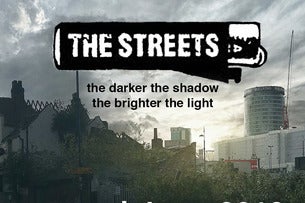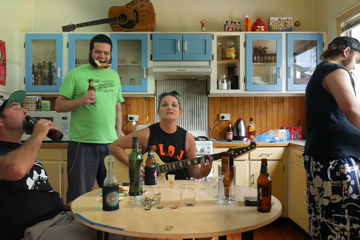The Streets play the Annex at Livid at the RNA Showgrounds on Saturday.
Meet Mike Skinner, aka The Streets. The Brit press is calling him ‘the future of garage’ after heralding The Streets' single, Has It Come To This, with the kind of floral hyperbole reserved for only the biggest of next-big-things. What got the lot going off half-cocked was Skinner's MC chat that is said to be ‘an unparalleled evocation of British street life’. It's all there - Everykid UK. The lot of the working class; the McDonalds, the bus stop, the dealers, the club, the pub, traffic jams, dirty tall buildings, old dumps, sneakers, hooded parkas, the whiff of fish and chips – street culture.
The Streets' album, Original Pirate Material, is now similarly celebrated (NME was in raptures) and there's little doubt that this one-man band - The Streets was conceived as a posse project when many of Skinner's early friends were interested in taking part but in the end became just Mike - has a lovely lyrical touch for his easy on the ear rapping. Musically, well it's garage, broadly speaking, but Skinner's take on garage is so open-minded that mostly it sounds nothing like the output of the genre's other crews. Dub reggae, Massive Attack, hip-hop, even a touch of early ska, the influences roll by as Mike rambles on about life in his neck of the hood - downtown Birmingham. It's living on the breadline stuff with a touch of poetry and nary a whiff of romance.
So what do you talk to a Birmingham boy about? Plastic glasses, of course. Down the wrong end of town even the bar seats are nailed to the floor and the windows are barred.
"Yeah, yeah, there's a few of those places in Birmingham that use plastic glasses. It's a lot safer but it looks a bit weird because the glasses are usually coloured so you end up with a bright pink pint. Now that's fookin' weird. It's dead grimy down there though. I'm probably half and half. I didn't have an easy life but for Birmingham I grew up pretty middle-class. Having said that you don't even know what middle-class is until you get to London. There I'd be workin' class but in Birmingham I'm doing alright."
Fuss, then. "Yeah, it's good,' Skinner says, "because, particularly in business you get what you want to do. Creatively, a lot of doors have been opened. On the down side, it's just a fuckin' album, you know what I mean. You do get a nasty side to the hype. You don't ask for either.”
Don't miss a beat with our FREE daily newsletter
"I've worked hard to put the details in on the record. Maybe that's what makes it different. It comes very natural and I don't really think a lot about it. Mostly, the lyrics are stream of conscious. Mind you, there's a lot of shit stream of conscious you come out with. If you just talk what's on your mind, there's a lot of rubbish. You've just to get rid of the rubbish bits. It can be quite inspiring writing like that.”
"By the time I was nine I knew all I wanted was to make records. I'd started fuckin' around with keyboards when I was five. By 15 I'd turned my bedroom into rap central. Another thing that shaped how I've ended up doing it was growing up in Birmingham, and there's no opportunity there. There was nobody hearing what I was doing for eight years.”
"If I was living in London, I'd have just been making garage records - the way garage records are supposed to sound. However, because I've been making records and nobody has been hearing them and because I haven't been submerged in the garage scene, I've just been into it from a distance, then I've developed in a different way.”
Now everybody is beginning to copy The Streets.
Skinner laughs, "I wouldn't see it as copying. What do they say: Imitation is the sincerest form of flattery. What's important to me is that there is thing going on in the garage scene that is more about the MC and I'm going to be working around that in the future. It's not that people are copying me, there's a kind of scene growing anyway."
Having started work on The Streets second album, Skinner doesn't want to stand still. He's moved from Birmingham to Brixton and is eyeing off a different sound.
“There's a lot more ragga in it - just because I live in Brixton and that's the sound. In places it's a lot slower."
Brixton used to be a tough, West Indian-dominated, neighbourhood although in recent years some of it has been moved up market with 'progress'. Mike Skinner doesn't live in that neck of the woods.
"I walked out me house the other day and there was these two geezers having a sound off or whatever. You've got one guy over there with a massive sound system behind him and another guy opposite him with the same and they're just like battling each other in the street, and there's all these people standing round watching and dancing. It's just unbelievable to see that at the end of your road. It's that Jamaican thing of 'Get your speakers out. We'll have it. Yeah’."


















